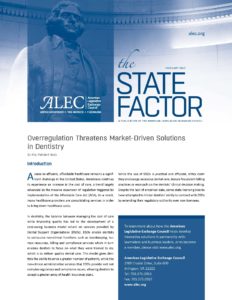Human Services
Key Points
- Aggressively pursue evidence-based models that fight fraud, waste, and abuse.
- Increase the off-ramp for those who are not truly needy.
- Regulators and elected officials integrate specific program indicators and outcomes to taxpayer dollars for public assistance.
- Where possible, services for at-risk populations should be case managed to provide a centralized and comprehensive approach for individuals and families, allowing for less duplication and better chance for success of the individual.
- States should encourage integrating private assistance into state operated programs, encouraging less dependency on bureaucracy and more on existing community resources.
The welfare state is larger than it has ever been in U.S. history. As Americans we spend nearly one trillion dollars a year on federal and state human services programs, yet despite public investment the poverty rate has risen to 15.1 percent. Public assistance is necessary to help those who are truly in need, however these programs are rarely called on to show effectiveness in creating true opportunities for individuals and families to escape dependence and pursue a life of success and prosperity.
At ALEC, our objective is to help states implement policy that will modernize human services programs so public investment in human services not only create opportunities for self sufficiency, but to use data metrics in state based programs to show which program operations are more effective in fighting poverty for at-risk populations.
Other common sense approaches to breaking the cycle of dependency is reducing regulatory barriers to communities and leveraging existing resources to coordinate services while also working to aggressively reduce fraud, waste and abuse.
It has been said that a society can be judged by the way it treats those least able to care for themselves. At ALEC, we work to foster a competitive yet compassionate society that leads each person to the dignity of work and culture of success and prosperity.
Model Policies
-
The Kinship Care and Fictive Kin Reform Act Final
Section 1. Title. This Act shall be known as The Kinship Care and Fictive Kin Reform Act. Section 2. Purpose. All children need safe homes, nurturing role models and caring relationships to grow and thrive. Sometimes children cannot stay in their homes with their parents for a variety of reasons…
-
Statewide Health Data Utility Act Final
Section 1. Declaration of Purpose A state health data utility (“HDU”) can help achieve better patient outcomes, improve the overall health and wellbeing of the people of [STATE], and reduce the cost of health care by creating a more seamless, transparent, and modernized approach to sharing health information. This bill…
-
Hospital Price Transparency Act Final
Section 1: Short Title This Act shall be known and may be cited as the Hospital Price Transparency Act. Section 2: Purpose The purpose of this Act is to require healthcare facilities to disclose prices for certain items and services provided by certain medical facilities; provide administrative penalties; prohibit collective…
-
Child Protection Investigations Reform Act Final
A BILL TO BE ENTITLED AN ACT relating to notifying a person accused of child abuse or neglect of the person’s rights in connection with an investigation conducted by the Department of Family and Protective Services [or replace with appropriate name of state child welfare agency]. BE IT ENACTED BY…
-
Pharmacist Prescribing Authority Act Final
Be it enacted by the legislature of the state: Section 1. Short Title This Act shall be known and may be cited as the Pharmacist Prescribing Authority Act. Section 2. Purpose The purpose of this Act is to authorize pharmacists to practice the full extent of their education and…
-
America’s Missing Foster Children Final
Section 1. A Photograph is Critical: Waive Fees for State ID Cards A. Fees for state non-operating identification cards do not apply to children in the custody of the department of child protection. B. If an applicant for a non-operating identification license is at least sixteen years…
Press Releases
-
New Report Highlights Detriments of Overregulated Dental Industry
FOR IMMEDIATE RELEASE Contact: Taylor McCarty tmccarty@alec.org 571-482-5023 Arlington, VA (February 28, 2017) – Since the implementation of the Affordable Care Act (ACA),…
-
New Report Highlights Detriments of Overregulated Pharmaceutical Industry
FOR IMMEDIATE RELEASE Contact: Ashley Pratte apratte@alec.org Arlington, VA (January 11, 2017) – Since the implementation of the Affordable Care Act (ACA), the cost of prescription drugs have…


